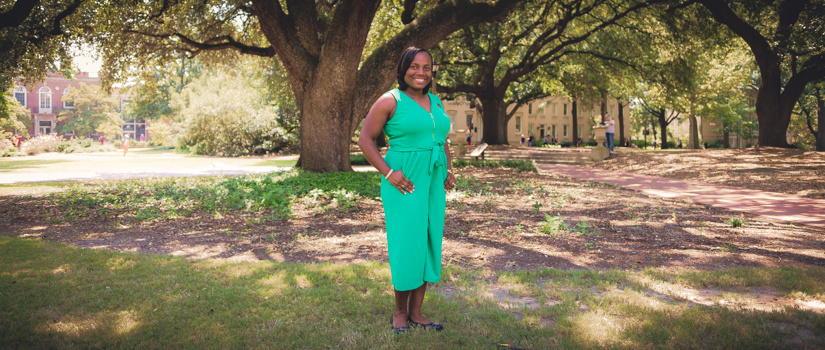Amirah Cotton's experiences sparked a desire to impact fellow military members
Nov. 18, 2019
Chris Woodley • cwoodley@mailbox.sc.edu
The challenges of balancing family and military life helped turn Amirah Cotton’s eyes to a degree that impacts others in similar situations.
Cotton, a Master of Social Work advanced year student at the University of South Carolina, is married with two young children. In addition to the responsibility of being a wife, mother and non-traditional student is the weight of being active-duty military along with her husband.
There have been times when Cotton was geographically separated from her husband for several years or has experienced long workdays apart. This type of balancing act can be a strain on the well-being of individuals and families.
Those dynamics also led to early doubts from family and friends that she could handle the long list of responsibilities. The challenges turned into a calling for Cotton at South Carolina’s College of Social Work.
“My own experiences and seeing other military families focused me toward social work,” Cotton says. “I want to help service members see the positives and look forward to the future, even when they are experiencing difficult issues. Social work has made me want to help people in a mental health capacity by being a counselor or therapist. The Army has numerous job opportunities, including social workers on active duty.
“I want to meet people by listening to understand, instead of listening to respond. This could be how to overcome their family or environmental factors, looking at things from a different perspective, and honoring their feelings and experiences while knowing how to achieve the goals they want to achieve. Improving their quality of life is my No. 1 goal for people.”
A native of Queens, New York, Cotton attended high school in Charlotte, North Carolina. Only two weeks after graduating in 2010 with a bachelor’s degree in business administration and management from St. Augustine’s University in Raleigh, North Carolina, Cotton was commissioned into the U.S. Army. She is currently in human resources as a captain in the Adjutant General Corps.
“As an undergraduate student prior to becoming active duty, I signed a contract with the military that gave me the option between my sixth and 11th year to pursue a graduate degree through the Advanced Civil Schooling option,” Cotton says. “As part of the program’s requirements, I am required to remain in the Army for six years after graduating. For each day spent as an MSW student, I owe the Army three days of service.”
Cotton intended to earn a master’s degree in business administration while working as a human resources officer in the Army. But her decision to pursue a social work career was influenced by her own experiences.
My own personal experiences of becoming a mother and trying to maintain a career has been my greatest challenge. But it’s propelled me to become a counselor because I have similar experiences to the people I’m trying to help to put their lives back together.
- Amirah Cotton
Prior to moving from Fort Bragg, North Carolina to Columbia in July 2018, Cotton and her husband were geographically separated for 3 1/2 years. The couple is now together in Columbia, but her husband, a combat training company commander, works six days a week beginning at 5 a.m. and does not return home until late or whenever the daily mission is complete.
“Service members on active duty often serve apart from their spouses. The civilian spouse stays at home and primarily takes care of the children,” Cotton says. “For me, trying to maintain a relationship and raise a family was harsh and difficult. We've had to rely on extended family members to help us with our children because we still have our responsibilities to the Army and our professions.”
Cotton has a 3-year-old daughter and 1-year-old son, who was born only a month before Cotton began her master’s degree studies last year. Witnessing the family dynamics unfold and balancing military duties with raising a family opened her eyes to understanding service members’ daily responsibilities while maintaining normalcy outside the military.
“The military has helped me to prepare by time management, and how to articulate myself and engage with others from different races, cultures and socioeconomic levels,” she says. “It has helped me to work with people and find commonalities. We are more similar than different, and I use people's strengths instead of focusing on their weaknesses for all of us to come together and accomplish the mission.”
Prior to beginning graduate school, some of Cotton’s family members and friends doubted her ability to multitask two young children, military duties and school. But her husband’s support and his advice to navigate situations through different methods has been essential to her success.
“You constantly doubt yourself, your decision, and if it’s the best thing for your family. But I feel that I’m being led to help people in the mental health and recovery fields,” she says. “My own personal experiences of becoming a mother and trying to maintain a career has been my greatest challenge. But it’s propelled me to become a counselor because I have similar experiences to the people I’m trying to help to put their lives back together.”
While most non-traditional students are not in Cotton’s unique situation, she does have advice for people raising families who aspire to pursue a degree.
“Be firm in knowing what you want. I was done with being tired and wanted to help people in a different way than human resources,” Cotton says. “If you want to do something different, you may need to find other resources to accomplish your goal. It's possible, but it might not be in the conventional way. Be prepared to think outside the box.”
